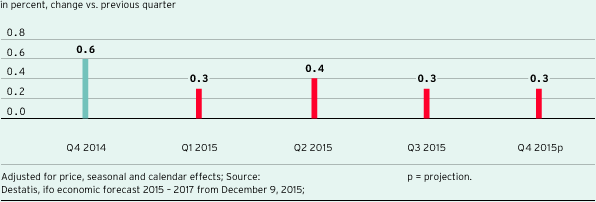Economic Development
In 2015, the German economy grew by 1.7 % in real terms compared to the previous year (previous year: 1.6 %); for the fourth quarter, the ifo Institute and the Federal Statistical Office (Statistisches Bundesamt; Destatis) both expect growth of 0.3 % quarter-on-quarter. Positive effects were provided in particular by private consumption, which grew by a robust 1.9 %. In addition, government consumption — due to increased spending as a result of the migration of refugees, among other things — also contributed important growth stimuli. Moreover, low interest rates combined with a weak euro pushed exports. In contrast, business investments did not develop with the anticipated momentum: Despite favorable financing conditions and low commodity prices, propensity to invest fell short of expectations.
In the eurozone, the economy has stabilized further. In addition to the continuing expansionary monetary policy of the European Central Bank (ECB), private consumption, boosted by increased household incomes and low energy prices, provided significant growth stimuli. Against this backdrop, the ifo Institute expects real quarter-on-quarter growth of 0.4 % in the fourth quarter of 2015 and a growth rate of 1.5 % for 2015 as a whole (previous year: 0.9 %).
The global economy grew more slowly in 2015 than was expected at the beginning of the year. Although the prospects for most industrialized nations were positive on the whole, because the global economy was supported in particular by the robust growth rates in the US, major emerging markets such as China fell considerably short of expectations. At the same time, the low commodity prices held back the economic development in Russia and Brazil. In addition, the global economy was negatively impacted by geopolitical developments and especially the ongoing conflicts in Ukraine and Syria as well as terror attacks. In light of this, the International Monetary Fund (IMF) forecasts real growth of 3.1 % for 2015 (previous year: 3.4 %).
Development of gross domestic product in Germany
